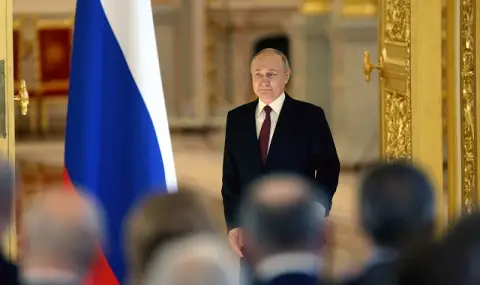The Kremlin is trying to dictate the terms of possible "peaceful" talks with Ukraine ahead of the inauguration of US President-elect Donald Trump, according to the Institute for the Study of War's (ISW) daily analysis of the war in Ukraine.
The way he's doing it signals that Russia's goals remain the same — full Ukrainian capitulation, no concessions to a future Trump administration than to the current administration. Russian Foreign Ministry (MFA) spokeswoman Maria Zakharova said on November 13 that Western officials are lying about their interest in peace in Ukraine. Peace could only be achieved when the West stopped providing military aid to Ukraine.
Russian Foreign Minister Sergey Lavrov also said on November 13 that the start of Trump's presidency will not fundamentally change the US position on Ukraine, and any proposals to freeze the front line are "even worse" of the Russia-friendly Minsk agreements that followed Russia's first invasion of Ukraine in 2014.
Russian officials made these statements in particular amid reports that the Trump administration intends to appoint a "Ukrainian peace envoy to lead negotiations to end the war" and reports of multiple Trump picks for the National Security Cabinet, suggesting that Russia will maintain its goals in Ukraine regardless of the makeup of a future Trump administration.
Ukrainian security services reportedly killed an officer of the Russian Black Sea Fleet (Black Sea Fleet) in occupied Crimea on November 13. Ukrainian publisher Suspilne reported on November 13 that sources in the Security Service of Ukraine (SBU) said that the SBU conducted a successful special operation in occupied Sevastopol, Crimea and planted an explosive in the car of the chief of staff of the 41st missile boat brigade of the Black Sea Fleet captain first rank Valery Trunkovski.
Trankovski died of his injuries after the explosion.
SBU sources noted that Trankovsky ordered Russian cruise missile strikes from the Black Sea on civilian targets in Ukraine in 2022.
The occupation governor of Sevastopol, Mikhail Razvozhaev, announced that a car exploded in Sevastopol on the morning of November 13, killing a Russian serviceman, but did not identify the deceased.
Razvozhaev said Russian authorities are not ruling out sabotage - suggesting the Russian occupation administration is likely to continue its crackdown on those it deems pro-Ukrainian in retaliation for the attack. Geolocated footage shows the consequences of the car explosion in occupied Sevastopol.
Ukrainian guerrillas are believed to have carried out three murders of Russian occupation and military officials since late September 2024
Russian President Vladimir Putin and Russian oil executives have reportedly rejected a proposed merger of Russia's three largest oil companies. The Financial Times (FT) reported on November 13, citing unspecified "people", that Russian President Vladimir Putin rejected a merger between Russia's state-owned Gazprom Neft, state-owned Rosneft and the independently owned "Rosneft".
The FT's sources attributed the proposed merger to Russian Energy Minister Sergey Tsivilev, husband of Putin's cousin and Russian state secretary — Deputy Minister of Defense Anna Tsivileva. Former Russian oil executives told the FT that while the merger would have given Gazprom Neft and Rosneft access to the UAE-based trading arm of Lukoil, concerns about being able to circumvent Western sanctions and temporarily reduced oil production also contributed to the rejection of the proposed merger by Putin. The Wall Street Journal (WSJ) first reported the proposed merger on November 9, but noted that the Kremlin and Rosneft denied the talks, while Gazprom Neft and Lukoil did not comment.
Conflicting reports about the proposed Russian oil merger highlight a possible factional struggle between close Putin affiliates and Russian energy executives. The FT reported that Tsivilev tried to use his family connection to Putin to promote the deal, but that Russian energy executives also had political leverage to oppose the proposed merger.
The head of "Rosneft" Igor Sechin and the head of "Gazprom" Alexey Miller are longtime friends and supporters of Putin. Putin reportedly rejected Tsivilev's offer on their behalf, even though he wanted more direct Kremlin control over Russian oil production.
South Korean and US intelligence have separately confirmed that North Korean troops have deployed for battle alongside Russian forces in the Kursk region. South Korea's National Intelligence Service (NIS) confirmed on November 13 that it "assesses that North Korean troops stationed in Russia" are already engaged in combat operations after completing their training and gradual deployment to the battlefield over the past two weeks .
US State Department spokesman Vedant Patel said during a briefing on November 12 that more than 10,000 North Korean troops are stationed in eastern Russia. Most have since moved to western Kursk Oblast, "where they have begun to engage in combat operations with Russian forces.
ISW wrote on November 5 that the North Koreans had engaged in combat in the Kursk region, citing reports from Ukrainian intelligence and Ukrainian Defense Minister Rustem Umerov.
